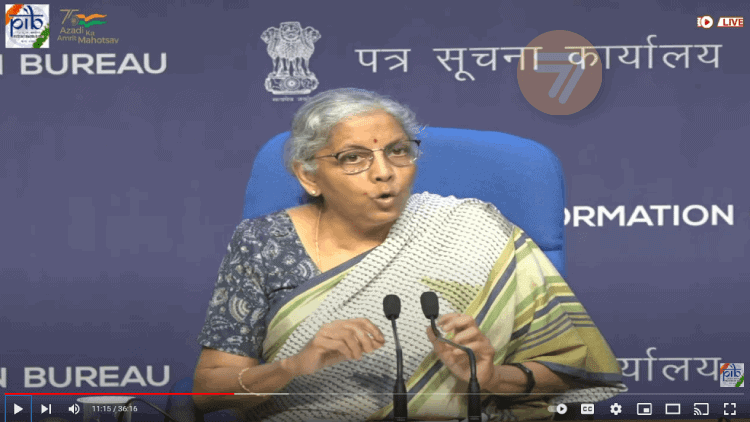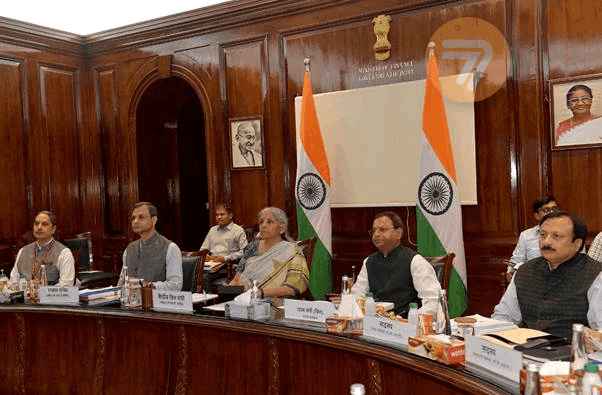Skill Games Didn’t End Up with Heavier GST than Casinos
04 Aug 2023
GST on Entry Deposits, Not Bets; Equalized with Buying Casino Chips
At its urgently convened 51st Meeting held over video conferencing on Wednesday, August 2, 2023, the GST Council decided to give relief to online real money gaming companies, clarifying that the recently recommended 28% GST levy on full face value of wagers will be applicable over entry deposits, and not on every single bet. Read more about the GST for Skill Games.
The Union Minister of Finance and Corporate Affairs Nirmala Sitharaman announcement after the previous 50th Meeting of the GST Council conducted on July 11 in New Delhi, said that 28% GST will be levied “on the face value of the chips purchased in the case of casinos, on the full value of the bets placed with bookmaker/totalisator in the case of horse racing and on the full value of the bets placed in case of the Online Gaming,”
This means that if you go to a casino in Goa and purchase chips, you will be charged GST on top of their value, but then you can spend the whole evening betting and winning and losing until all your casino chips are exhausted, without any obligation to pay GST before each single bet or after each win (safe from income tax on winnings).
At the same time, the FM’s words were interpreted by many, including gaming businesses, to mean that every subsequent bet, including when betting the winnings from an already taxed bet, will have to be charged leading to cases when up to 60%-70% of every wagered rupee will go for GST.
“It’s True”, the Burden Would be Too Heavy
“There are pros and cons both ways as to whether we tax it at the entry level itself or we tax each and every bet, the taxation, as has been claimed by the gaming industry, becomes very high in case it is taxed at each and every bet. That’s true. It’s a fact, it’s true,” Revenue Secretary Sanjay Malhotra had admitted in an interview a few days before the 51st GST Council Meet.
“That is the question which has been troubling the gaming industry. The gaming industry, they have various federations, all of them have met me, they have met others, we have taken their request on board,” Malhorta had clarified, pointing to the bustling activity exercised on all fronts by the whole gaming industry after the shock delivered by the 50th Meeting of the GST Council.
The Turmoil Caused by the GST Council Decision
At the long-awaited 50th Meeting on July 11, the GST Council decided to remove any differences between games of skill and games of chance in indirect tax treatment and levy all three forms of gaming discussed – casino, horse racing, and online games, with the highest GST slab usually reserved for luxury and “sin” products, including the prize pools of skill gaming contests.
Naturally, after the GST Council decision was announced, homegrown skill gaming companies, who had build their business model over the practice of charging 18% GST only on their GGR (Gross Gaming Revenue), filled the space with desperate cries warning that the new levy is set to deliver a “death blow” to the country’s nascent gaming industry and put PM Modi’s vision of a trillion dollar digital economy in jeopardy.
Letters signed by 127 gaming companies and organizations
Letters signed by 127 gaming companies and organizations, including Baazi Games, Gameskraft, Nazara, WinZO, 30 investors and Venture Capital (VC) firms, like Peak XV Partners, Kalaari Capital, and Tiger Global, were sent to the Union Government and personally to the Prime Minister asking for a reconsideration of the recommendation by the GST Council.
Some hope was derived from interactions with the Ministry of Economics and IT (MeitY) and Minister of State Rajeev Chandrasekhar, who had to clarify a bit later that he wouldn’t try to intervene before MeitY’s efforts to regulate online gaming space in India were finalized.
“As regulatory framework for permissible online gaming stabilizes we will rqst GST Council to study n consider new Framework,” MoS Chandrasekhar tweeted. “Both FinMin n MeiTy are working togethr in Whole of Govt approach to challenges n opportunities in Digital space.”
“Things might get relatively more difficult for some of the smaller players”
After the initial shock, some gaming businesses have already started assessing the new situation and are trying to figure out how to proceed.
“Things might get relatively more difficult for some of the smaller players. Investors are already asking whether the sector is as attractive as before. We need to decide whether to pass on the entire burden to the users and retain our profit levels in the short term, or play the longer game (and absorb some of the increased tax),” an executive from a gaming company was quoted by media.
Offshore Gaming Will Be Levied under GST or Blocked
Another important decision was taken at the latest 51st Meeting of the GST Council. It was to recommend amendments to the IGST Act, 2017. Clarifying GST liability when a supplier based outside India provides online money gaming to a user located in India.
The amendments will introduce a “simplified registration scheme” for such suppliers. They will also include a certain mechanism. “For blocking of access by the public to any information generated, transmitted, received or hosted in any computer resource.” This applies to resources used for the supply of online money gaming by such suppliers. The mechanism will be enforced in case of failure to comply with provisions of registration and payment of tax. As stated in the Ministry of Finance press release.
The Union Ministries of Finance and IT are working together. Their aim is to ban and block all foreign apps and websites that do not pay GST in India. These apps are even advertising “No GST, No TDS” to lure desi gamers. This, according to information released a few days before the GST Council 51st Meeting.
A senior-level source from a gaming company commented. “They (offshore platforms) are taking advantage of the fact that gaming companies are in a Catch-22 situation right now.”
Review Six Months After Implementation, Planned for October 1
At its latest 51st Meeting, the GST Council decided on a few key points. Additionally that best efforts should be made to have all corresponding amendments to the GST legislation in a timely manner. So that the changes take effect as of October 1, 2023.
The whole process will be difficult and time consuming. Because amendments to state-level laws would also be necessary. This, besides having to amend central legislative pieces. Including the CGST and the IGST Acts. As well as the CGST Rules and Schedule III of the CGST Act.
At the same time, the GST Council agreed to reexamine GST treatment on gaming. This, after a period of six months expires upon the implementation of the new GST regime.
Tamil Nadu Insists GST Laws Reflect the State’s Online Gaming Ban
The Finance Minister of Tamil Nadu, Thangam Thennarasu, voiced his government’s reservations about the proposed amendments to GST legislation. He spoke during the 51st GST Council Meeting, held via video conference. The discussion was linked to the recently implemented TN Prohibition of Online Gambling and Regulation of Online Games Act, 2022. This act has been challenged in court. It banned online games involving real money. Including rummy and poker, which are usually recognized as skill games.
GST Acts should not cover games with outcomes based on chance. Neither games which have been banned by any law that is currently in force. According to TN FM Thennarasu.
The other state representatives in the GST Council who opposed the decision were the Delhi Finance Minister. And the representation from Goa and Sikkim who insisted GST to be levied on GGR only.
I&B Ministry Will Regulate Gaming Content Policies and Advertising
The Central Government has notified that “films and Audio-Visual programmes/content made available by online content providers/publishers would be brought under the heading “Ministry of Information and Broadcasting” in the Second Schedule of Government of India (Allocation of Business) Rules, 1961.”
With the changes, which will need to be followed up with the framing of new rules, will mandate the I&B Ministry to regulate policies for platforms that publish online gaming content, as well as online advertisement, after several advisories issued by the department to print, electronic, and digital media, including tech giants like Google warning against publishing of gambling ads.




